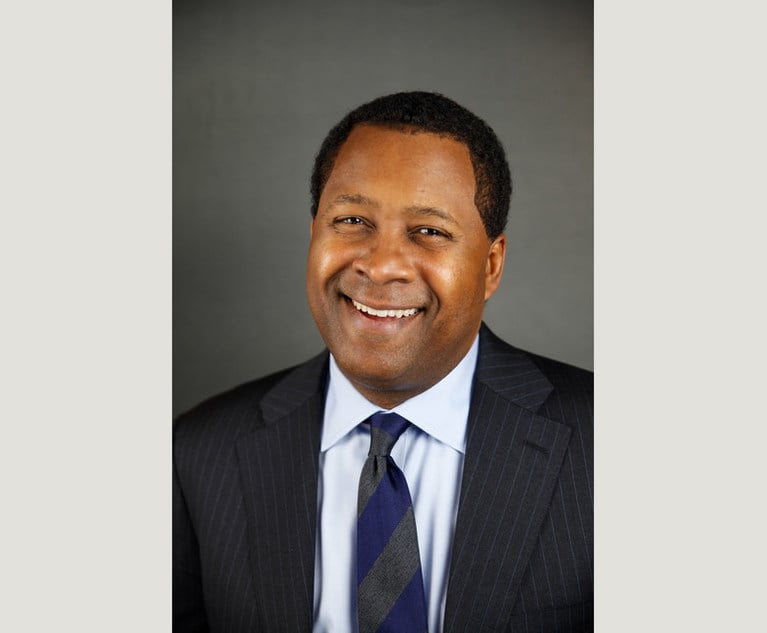Compliance Hot Spots: 'Roller Coaster' Considerations for Coronavirus Borrowers | New FARA Filings | Consumer Bureau in Focus | Ex-Jones Day Partner Picked for D.C. U.S. Attorney
Welcome to Compliance Hot Spots. Inside the wild ride over coronavirus relief. Who got the work: Arnold & Porter advocates for Argentina, and three former KPMG audit partners settle SEC claims. Scroll down for compliance headlines, notable moves and more. Thanks for reading!
May 19, 2020 at 09:00 PM
10 minute read
Welcome to Compliance Hot Spots, our snapshot on white-collar, regulatory and compliance news and trends. On tap this week: Inside the wild ride over coronavirus relief. Who got the work: Arnold & Porter advocates for Argentina, and three former KPMG audit partners settle SEC claims. Scroll down for compliance headlines, notable moves and more.
Thanks for reading, and we'd love your feedback. Contact C. Ryan Barber in Washington at [email protected] and at 202-828-0315. Follow @cryanbarber.
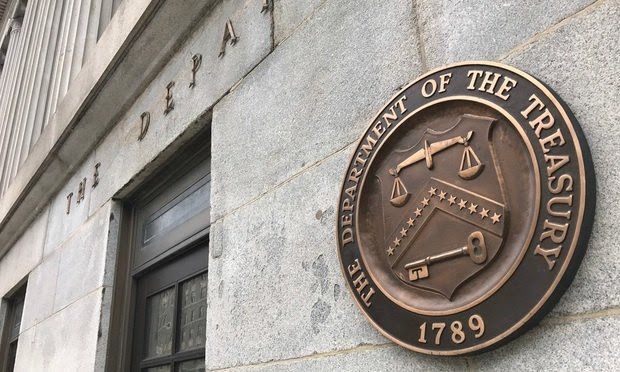 Updated May 20. Correction appended
Updated May 20. Correction appended
Keep or Return: Inside 'Roller Coaster' Consideration for Coronavirus Borrowers
Late last month, amid questions around whether companies were improperly tapping into pandemic relief loans meant for struggling small businesses, U.S. Treasury Secretary Steven Mnuchin delivered a warning.
Mnuchin promised audits of all borrowers that received more than $2 million in loans, threatening that criminal prosecution could await companies and executives found to have falsely certified that they needed emergency funds to keep their businesses afloat. But with the tough talk came a pathway out of potential criminal liability, a so-called "safe harbor" period to return coronavirus relief money.
That "escape hatch," as Covington & Burling lawyers described it in an alert to clients, set off a scramble, with companies forced to balance their financial needs against the risk of future scrutiny from the federal government. It was a calculation that seemed to grow only more complicated as the Small Business Administration gave further guidance, weeks after borrowers certified their need for coronavirus relief, about what conditions must be met to be considered deserving of the loan support. One piece of guidance, issued in late April, said companies should consider their access to other sources of liquidity sufficient to support their operations "in a manner that is not significantly detrimental to the business."
"It has been a bit of a rollercoaster," said Morgan, Lewis & Bockius partner Andrew Budreika.
"What they really said was, 'We want you to go back and reassess the necessity of the funds,'" he added. "Some clients were truly out of options. Others, like a public company, perhaps, or a company with financial investors with additional capital to deploy, had a harder time getting comfortable with the certification."
For many companies, it was a calculation made against the clock. The safe harbor period, initially set to expire May 7, was extended to May 14 and then once more to Monday, as companies digested the stream of new guidance and weighed the risks. Among those risks: the reputational harm of being caught up in the naming-and-shaming of organizations, such as the Los Angeles Lakers and publicly traded companies, that were seen as pursuing loans without an urgent need for relief funds.
"There is a lot of public scrutiny on this program right now, in particular on public companies and others who accepted these loans. And that can sometimes drive investigations, or at least be in the background, so borrowers need to need to think hard about that," said Covington partner Daniel Suleiman.
Last week, as the safe harbor period closed, the SBA issued further guidance that borrowers with loans of less than $2 million will be deemed to have certified their need for that funding in good faith. The SBA said it had determined borrowers with loans below that threshold are "generally less likely to have had access to adequate sources of liquidity in the current economic environment," adding that the approach would help the agency conserve its "finite audit resources."
"The new guidance was generally met with relief for all loan applications," said Angela Styles, a partner at Akin Gump Strauss Hauer & Feld. "It was fairly obvious that the earlier guidance on access to capital created a chilling effect that both slowed down the applications and resulted in many companies deciding the loan was simply not worth the effort, so they gave it back."
>> More reading at the WSJ: At Least 30 Public Companies Say They Will Keep PPP Loans
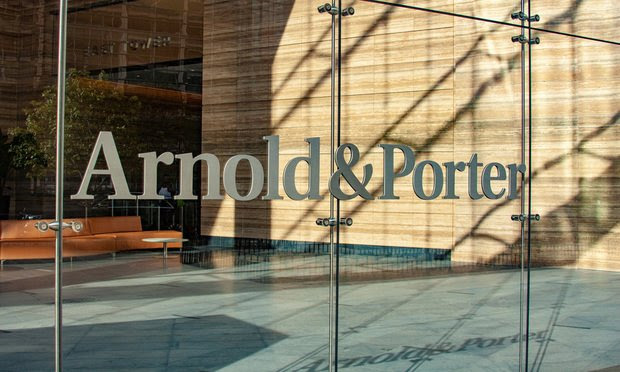
Who Got the Work
>> Thomas Shannon, a senior international policy adviser at Arnold & Porter, and partner Raul Herrera have registered with the U.S. Justice Department as a foreign agent for Argentina. In a disclosure, submitted under the Foreign Agents Registration Act, Shannon said he will "provide strategic advice and assistance" to Argentina on its relationship with the United States and that he anticipates meeting with U.S. officials on the country's behalf. Shannon served in the Obama administration as the U.S. ambassador to Brazil and later as undersecretary of state for political affairs. The firm said it would charge nearly $2 million for the advocacy.
>> Amanda Anderson, a former Obama aide and senior manager for federal affairs at Uber, has registered as Square Inc.'s first in-house lobbyist. In a disclosure, the mobile payments company said she will lobby on "issues related to payment processing, mobile payments, lending and fintech, small business lending, and COVID-19 relief."
>> "The city of Detroit is hiring a lobbying firm, using federal coronavirus relief dollars, to advocate for more of the U.S. government's future pandemic assistance funding. Detroit City Council on Tuesday approved a yearlong, $180,000 contract with Squire Patton Boggs LLP, a global lobbying and law firm with roots in Cleveland. The funding comes out of Detroit's $117 million share of federal Coronavirus Aid, Relief, and Economic Security (CARES) Act dollars," Crain's Detroit Business reports.
>> Sidley Austin partner David Petron advised Morningstar Credit Ratings LLC in an SEC settlement over "violating a conflict of interest rule designed to separate credit ratings and analysis from sales and marketing efforts," the U.S. Securities and Exchange Commission said. Morningstar, which did not admit or deny the claims, agreed to pay $3.5 million to settle the charges.
>> A team from Foley & Lardner—including Dennis Cardoza and Scott Klug, both former members of Congress—has registered to lobby for the Pennsylvania-based mobile and wireless medical technology company BioTelemetry Inc. on COVID-19 matters. Cardoza and Klug are co-chairs of the firm's federal public affairs practice.
>> Foley & Lardner partner Samuel Winer is counsel to former KPMG audit partners Timothy Daly and John Donovan in a new SEC action that alleged they "engaged in misconduct in connection with exams KPMG administered to test whether its audit professionals understood certain accounting and auditing principles." A third former KPMG audit partner, also accused in the alleged scheme, is represented by Foley Hoag attorneys Lisa Wood and Matthew Miller. More here at the WSJ: Three former partners at KPMG LLP agreed Monday to temporary suspensions from public accounting roles over cheating on training exams, the Securities and Exchange Commission said. The settlement is the latest fallout from an earlier SEC ethics probe that resulted in KPMG paying a $50 million civil penalty to resolve."
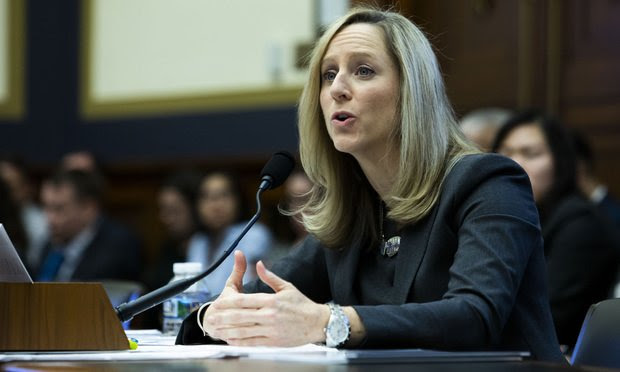
Compliance Reading Corner
Consumer Bureau Draws Fire for Pro-Business Tilt During Crisis. "With the agency facing an unprecedented wave of consumer complaints as millions of laid-off workers deal with their creditors, lawmakers and consumer advocates charge that the bureau is exploiting the crisis to further a pro-industry agenda. They're demanding that it set aside all rulemaking unrelated to the crisis and take a more forceful stance toward businesses that could use the chaos to rip off consumers." Kathy Kraninger, above, is director of the CFPB. [Politico]
U.S. Justice Dept. Subpoenas Wall Street Banks for Small Business Loans Info. "The U.S. Justice Department has sent grand jury subpoenas to big banks seeking records as part of a broader investigation into potential abuse of a $660 billion emergency loan program to help small businesses hurt by the novel coronavirus." [Reuters]
A Drug Company Wagers the U.S. Won't Dare Charge It With Crimes. "In the coming days, the Justice Department will make an important decision: whether to file criminal charges against one of the world's largest pharmaceutical companies for allegedly colluding with rivals to inflate the prices of widely used drugs. The company, Teva Pharmaceutical Industries, is betting that in the middle of a deadly pandemic, the Trump administration won't dare to come down hard on the largest supplier of generic drugs in the United States." [NYT]
Bankers Beware: Finance Giants to Monitor Staff WhatsApp Messages. "Danielle Tierney, a senior adviser on market structure and technology at Greenwich Associates, said the jump in WhatsApp use during the virus lockdown had helped financial services firms to realise 'that the best long-term strategy is to bring WhatsApp into their compliance coverage' as opposed to banning its use." [Financial Times]
Justice Department, State Attorneys General Likely to Bring Antitrust Lawsuits Against Google. "Both the Justice Department and a group of state attorneys general are likely to file antitrust lawsuits against Alphabet Inc.'s Google—and are well into planning for litigation, according to people familiar with the matter. The Justice Department is moving toward bringing a case as soon as this summer, some of the people said. At least some state attorneys general—led by Texas Attorney General Ken Paxton, a Republican—are likely to file a case, probably in the fall, people familiar with the matter said." [WSJ]
Stimulus Cops on Lookout for Fake Employees, Identity Theft. "Congress has thrown nearly $3 trillion at stemming the economic damage caused by the coronavirus pandemic. Now, Washington wants to make sure it knows where it is going. The flood of federal relief funds has created an outsize opportunity for fraud and misuse, pushing congressional leaders to fill top positions created to monitor the money. With a fifth aid package in the works, lawmakers, inspectors general and prosecutors are ramping up their scrutiny of money disbursed from the four bills already signed into law." [WSJ]
U.S. SEC Charges Two Companies, CEO Over Misleading COVID-19 Claims. "The U.S. Securities and Exchange Commission said on Thursday it has charged two companies and a chief executive officer with making misleading claims related to COVID-19, the disease caused by the novel coronavirus." [Reuters]

Notable Moves & Announcements
>> President Donald Trump plans to nominate Justin Herdman (above), the top federal prosecutor in Cleveland, as the U.S. attorney in Washington, putting the former Jones Day partner in line to lead an office reeling from the Justice Department leadership's unusual interventions in the cases of Roger Stone and Michael Flynn. In 2018, Herdman reported receiving a $405,000 severance payment from Jones Day, where he had worked for a couple of years in the white-collar practice before his nomination to lead the U.S. attorney's office for the Northern District of Ohio. That severance amount came on top of $928,000 in partnership share he reported receiving from Jones Day, as recorded on his 2017 and 2018 financial disclosures.
 >> Jenner & Block said the firm has brought on energy lawyer Jennifer Amerkhail (at left) as a partner in the Washington office. Amerkhail formerly worked at the Federal Energy Regulatory Commission and she most recently served as in-house counsel for Entergy Corporation's utility operating companies. "Jennifer brings comprehensive business and legal experience that positions our energy group for continued growth. Importantly, she is an excellent fit with Jenner & Block's culture and her values align with ours," Katya Jestin, Jenner & Block's co-managing partner, said. Read more here at the NLJ.
>> Jenner & Block said the firm has brought on energy lawyer Jennifer Amerkhail (at left) as a partner in the Washington office. Amerkhail formerly worked at the Federal Energy Regulatory Commission and she most recently served as in-house counsel for Entergy Corporation's utility operating companies. "Jennifer brings comprehensive business and legal experience that positions our energy group for continued growth. Importantly, she is an excellent fit with Jenner & Block's culture and her values align with ours," Katya Jestin, Jenner & Block's co-managing partner, said. Read more here at the NLJ.
>> Dentons senior advisor J. Mark Burkhalter in Atlanta is the Trump administration's pick for U.S. ambassador to Norway. Burkhalter, who served in the Georgia General Assembly for 18 years, focuses his work at Dentons on public policy and regulation.
An earlier version of this report misidentified the last name of Morgan Lewis partner Andrew Budreika.
This content has been archived. It is available through our partners, LexisNexis® and Bloomberg Law.
To view this content, please continue to their sites.
Not a Lexis Subscriber?
Subscribe Now
Not a Bloomberg Law Subscriber?
Subscribe Now
NOT FOR REPRINT
© 2025 ALM Global, LLC, All Rights Reserved. Request academic re-use from www.copyright.com. All other uses, submit a request to [email protected]. For more information visit Asset & Logo Licensing.
You Might Like
View All
Compliance Hot Spots: GOP Eyes ESG as an Antitrust Issue + Another DOJ Crypto Seizure + Sidley Partner Jumps to Main Justice
9 minute read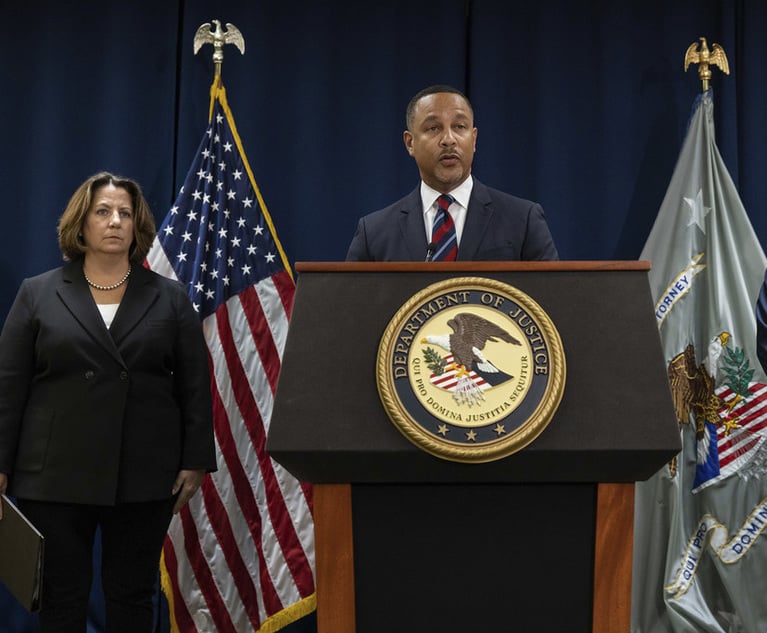
Compliance Hot Spots: Lessons from Lafarge + Fraud Section Chief Talks Compliance + Cravath Lands FTC Commissioner
11 minute readTrending Stories
- 1January Petitions Press High Court on Guns, Birth Certificate Sex Classifications
- 2'A Waste of Your Time': Practice Tips From Judges in the Oakland Federal Courthouse
- 3Judge Extends Tom Girardi's Time in Prison Medical Facility to Feb. 20
- 4Supreme Court Denies Trump's Request to Pause Pending Environmental Cases
- 5‘Blitzkrieg of Lawlessness’: Environmental Lawyers Decry EPA Spending Freeze
Who Got The Work
J. Brugh Lower of Gibbons has entered an appearance for industrial equipment supplier Devco Corporation in a pending trademark infringement lawsuit. The suit, accusing the defendant of selling knock-off Graco products, was filed Dec. 18 in New Jersey District Court by Rivkin Radler on behalf of Graco Inc. and Graco Minnesota. The case, assigned to U.S. District Judge Zahid N. Quraishi, is 3:24-cv-11294, Graco Inc. et al v. Devco Corporation.
Who Got The Work
Rebecca Maller-Stein and Kent A. Yalowitz of Arnold & Porter Kaye Scholer have entered their appearances for Hanaco Venture Capital and its executives, Lior Prosor and David Frankel, in a pending securities lawsuit. The action, filed on Dec. 24 in New York Southern District Court by Zell, Aron & Co. on behalf of Goldeneye Advisors, accuses the defendants of negligently and fraudulently managing the plaintiff's $1 million investment. The case, assigned to U.S. District Judge Vernon S. Broderick, is 1:24-cv-09918, Goldeneye Advisors, LLC v. Hanaco Venture Capital, Ltd. et al.
Who Got The Work
Attorneys from A&O Shearman has stepped in as defense counsel for Toronto-Dominion Bank and other defendants in a pending securities class action. The suit, filed Dec. 11 in New York Southern District Court by Bleichmar Fonti & Auld, accuses the defendants of concealing the bank's 'pervasive' deficiencies in regards to its compliance with the Bank Secrecy Act and the quality of its anti-money laundering controls. The case, assigned to U.S. District Judge Arun Subramanian, is 1:24-cv-09445, Gonzalez v. The Toronto-Dominion Bank et al.
Who Got The Work
Crown Castle International, a Pennsylvania company providing shared communications infrastructure, has turned to Luke D. Wolf of Gordon Rees Scully Mansukhani to fend off a pending breach-of-contract lawsuit. The court action, filed Nov. 25 in Michigan Eastern District Court by Hooper Hathaway PC on behalf of The Town Residences LLC, accuses Crown Castle of failing to transfer approximately $30,000 in utility payments from T-Mobile in breach of a roof-top lease and assignment agreement. The case, assigned to U.S. District Judge Susan K. Declercq, is 2:24-cv-13131, The Town Residences LLC v. T-Mobile US, Inc. et al.
Who Got The Work
Wilfred P. Coronato and Daniel M. Schwartz of McCarter & English have stepped in as defense counsel to Electrolux Home Products Inc. in a pending product liability lawsuit. The court action, filed Nov. 26 in New York Eastern District Court by Poulos Lopiccolo PC and Nagel Rice LLP on behalf of David Stern, alleges that the defendant's refrigerators’ drawers and shelving repeatedly break and fall apart within months after purchase. The case, assigned to U.S. District Judge Joan M. Azrack, is 2:24-cv-08204, Stern v. Electrolux Home Products, Inc.
Featured Firms
Law Offices of Gary Martin Hays & Associates, P.C.
(470) 294-1674
Law Offices of Mark E. Salomone
(857) 444-6468
Smith & Hassler
(713) 739-1250




